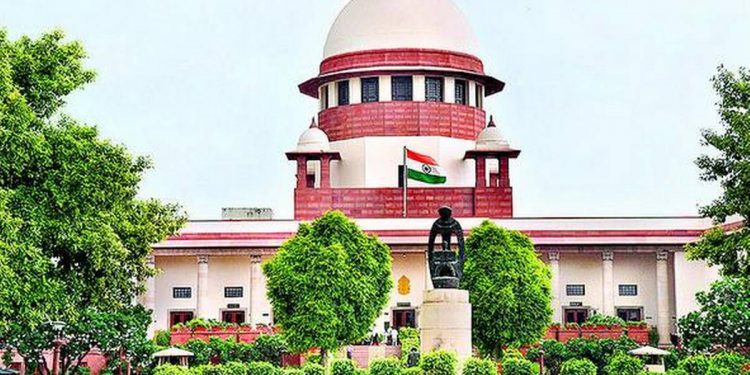New Delhi: The Supreme Court has held the state government has the power under Code of Criminal Procedure (CrPC) to release a prisoner after serving 14 years of jail term in cases of conviction for the offences prescribing death penalty as the maximum sentence.
However, the top court Tuesday said if the prisoner has not undergone 14 years or more of actual imprisonment, the Governor has the power under Article 161 of the Constitution to “grant pardons, reprieves, respites and remissions of punishment or to suspend, remit or commute the sentence” on the aid and advice of the state government and this authority “de-hors the restrictions imposed” under CrPC.
The observations were made by a bench of justices Hemant Gupta and A S Bopanna in a judgement by which it set aside the May 12, 2020 verdict of a single judge bench of the Punjab and Haryana High Court.
The apex court upheld the Haryana’s policy of August 13, 2008 on power to release prisoners by the state government, saying it was issued in exercise of powers conferred under CrPC and in supersession of earlier order.
The earlier policy cannot be put at a higher pedestal than the policy of 2008 for the reason that it seeks approval from the Governor, it held.
Under the 2008 policy, the case of premature release is being considered by the state government and individual cases are not required to be put up before the Governor as envisaged under earlier policy.
The high court had directed the Haryana government to consider the feasibility of drafting a fresh policy on premature release of prisoners particularly in respect of exercise of powers conferred under Article 161 (power of governor to grant pardon, reprieves etc) of the Constitution.
It had said the state may also consider the feasibility of having a policy with retrospective operation, provided the same does not lead to discrimination amongst substantial number of identically situated prisoners.
The high court had observed that till framing of the policy, the state government can exercise its powers under CrPC in terms of its policy of August 13, 2008 while strictly adhering to the restrictions imposed under CrPC.
“We find that the directions issued by the High Court are not sustainable for the reason that the policies have to be read keeping in view the period of imprisonment undergone by a prisoner.
“The power of remission is to be exercised by the State Government, as an appropriate Government, if the prisoner has undergone 14 years of actual imprisonment in the cases falling within the scope of Section 433-A of the Code and in case the imprisonment is less than 14 years, the power of premature release can be exercised by the Governor though on the aid and advice of the State Government,” the bench said.
“Consequently, the directions issued by the learned Single Bench are not sustainable and are hereby set aside,” it held.
Justice Gupta, writing the judgement for the bench, discussed the relevant provisions of CrPC and the Constitution and said that section 433-A of the Code starts with a clause restricting the right of the government, to suspend the sentence of imprisonment for life imposed on conviction of a person for an offence for which death is one of the punishments provided by law, that such person shall not be released from prison unless he has served at least 14 years of imprisonment.
“Therefore, the power of the appropriate Government to release a prisoner after serving 14 years of actual imprisonment is vested with the State Government,” it said, adding the Governor is not bound by any such restrictions, but he will have to act on the aid and advice of the state government.
The top court referred to several policies, issued in 1988, 1991, 2000, 2002 and 2008, of the Haryana on release of prisoners and agreed with the submissions of the government that they have been issued from time to time and the later policy has superseded the earlier one.
So there was no hiatus when a policy of premature release was not in operation or at any given point of time, the two polices were operational, the state government said.
The policy dated August 13, 2008 has been issued in exercise of powers conferred under CrPC and in supersession of Government Memorandum of April 12, 2002 and all other policies, it said, adding that the policy of 2008 is a “statutory policy”.
“The policy cannot and has not tried to take over the discretion vested in the Governor to grant pardons, remissions or commute sentence in exercise of powers conferred under Article 161 of the Constitution but it is the policy issued under a Statute and therefore, such policy has a statutory force,” it held.
The earlier policy of 2002 was also a statutory policy and cannot be put at a higher pedestal for the reason that it seeks approval from the Governor, it said.
PTI






































